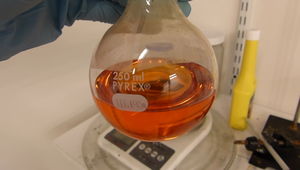Disulfur dichloride
 |
This article is a stub. Please help Sciencemadness Wiki by expanding it, adding pictures, and improving existing text.
|
 Freshly prepared disulfur dichloride.
| |
| Names | |
|---|---|
| IUPAC name
Disulfur dichloride
| |
| Systematic IUPAC name
Dichlorodisulfane | |
| Other names
Bis(chloridosulfur)(S–S)
Chlorosulfane Dimeric sulfenic chloride Sulfur monochloride Sulfur subchloride Thiosulfurous dichloride | |
| Properties | |
| S2Cl2 | |
| Molar mass | 135.04 g/mol |
| Appearance | Light-amber to yellow-red oily liquid |
| Odor | Pungent, suffocating |
| Density | 1.688 g/cm3 |
| Melting point | −80 °C (−112 °F; 193 K) |
| Boiling point | 137.1 °C (278.8 °F; 410.2 K) |
| Hydrolyzes | |
| Solubility | Soluble in amyl acetate, benzene, bromine, bromoacetic acid, carbon tetrachloride, chloroform, diethyl ether, ethanol, fuming cold HNO3, liq. chlorine, liq. SO2, tin(IV) chloride, |
| Vapor pressure | 7 mmHg (20 °C) |
| Viscosity | 0.978 cP |
| Thermochemistry | |
| Std enthalpy of
formation (ΔfH |
754.2 kJ/mol |
| Hazards | |
| Safety data sheet | CPCB |
| Flash point | 118.5 °C |
| Related compounds | |
| Related compounds
|
Sulfur dichloride Sulfuryl chloride Thionyl chloride |
| Except where otherwise noted, data are given for materials in their standard state (at 25 °C [77 °F], 100 kPa). | |
| Infobox references | |
Disulfur dichloride is the chemical compound of sulfur and chlorine with the formula S2Cl2.
Contents
Properties
Chemical
Disulfur dichloride is sensitive to moist air, due to reaction with water:
- 2 S2Cl2 + 2 H2O → SO2 + 4 HCl + 3/8 S8
Physical
Pure disulfur dichloride is a yellow liquid, with a pugnant irritating odor, that smokes in air.
Availability
Disulfur dichloride can be purchased from chemical supplier, however due to it's hazardous nature, it cannot be bought by individuals.
Disulfur dichloride is listed in Schedule 3 Part B - Precursor Chemicals of the Chemical Weapons Convention (CWC) and its production, sale or consumption may be subject to control by the OPCW (Organisation for the Prohibition of Chemical Weapons).
Preparation
Disulfur dichloride can be prepared by bubbling dry chlorine through molten sulfur. Direct chlorination of powdered sulfur also works with lower efficiency. In either case distillation is required for purification.
Projects
- Tetrasulfur tetranitride synthesis
Handling
Safety
Disulfur dichloride will react with water to release HCl and sulfur dioxide.
Storage
Disulfur dichloride should be stored in sealed bottles in a special cabinet. Ground glass is inappropriate as escaping vapour reacts with atmospheric air, depositing solid sulfur in the glass joints, gluing them together.
Disposal
Disulfur dichloride can be neutralized by mixing it with a basic solution. Slaked lime is very good.